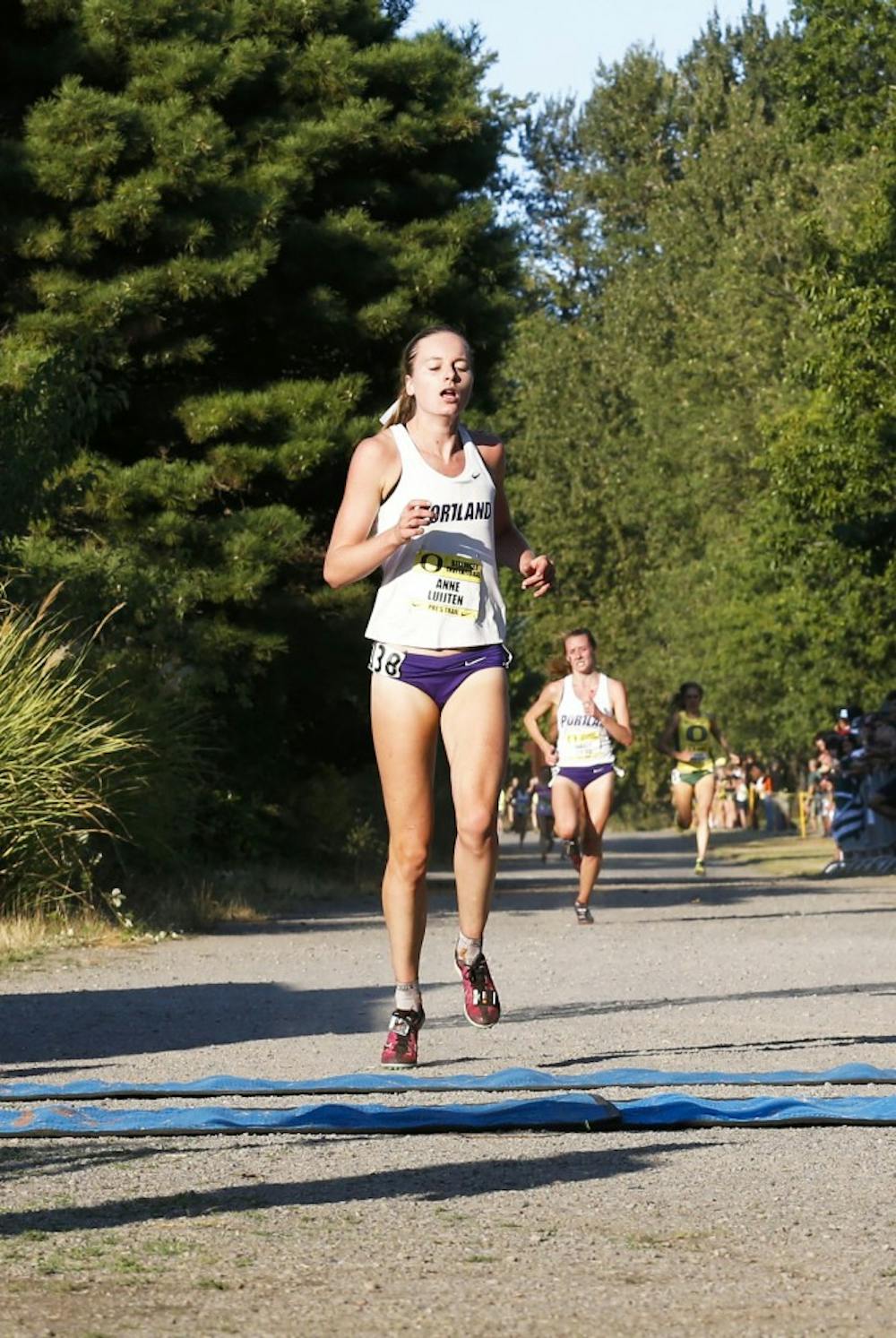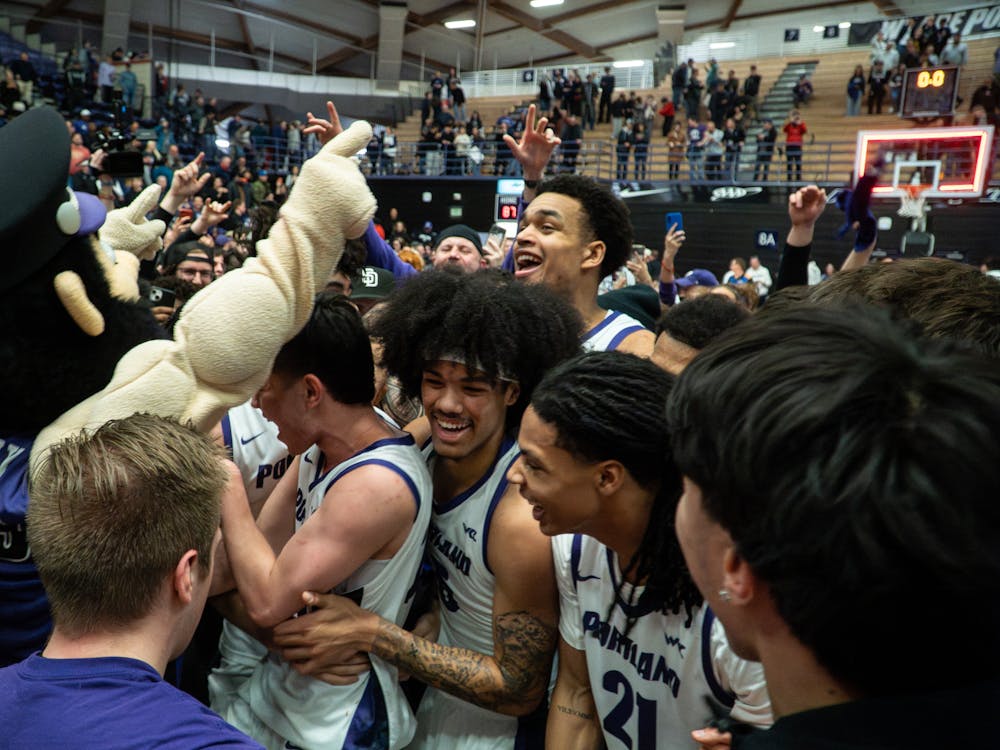Anne Luijten
Sport: Cross country
Grade: Junior
Hometown: Rijswijk, Netherlands
By Amanda Stowe |
How did you hear about UP since you came all the way from the Netherlands?
Well there were two other Dutch girls on the team, Marit Tegelaar and Merel van Steenbergen. In the Netherlands it’s really hard to both run and study because at universities you don’t have track teams. So it’s either running or studying; you can’t do both. So I started looking at universities in America, and I had heard from Marit and Merel who both live pretty close to me, that they were running at the University of Portland and they liked everything here. So I emailed them “What do you not like, what do you like?” And in the end I contacted Ian and I was like “Hey, can I come next year?” and I came.
Have you enjoyed your time here?
Yeah, I like it a lot. In the beginning, I didn’t know if I would go here for just one year or for four years. But now I definitely want to do four years, and I might do five years because the team is great. I have great people to run with, I have a great area to run in, I can get a good degree. I have everything I want here.
Was coming to Portland a bit of an adjustment?
I think the Northwest is more similar to Europe than any other place, or any other area in America. If I had gone to the south, I probably would have gotten culture shock. But here, it’s not that different from the Netherlands. I had to get used to the idea of people asking me how I am all the time. Like when you walk around UP it’s like 10,000 people asking “How are you?” “How are you?” and that’s not something we do in the Netherlands. We just say, “Hi,” and when someone asks, “How are you,” you expect that person to actually have a long story that’s going to take half an hour instead of “Fine.”
What are some other major differences between the cultures?
In sports, it’s the fact that we have track clubs outside of school. We don’t have the idea of sports teams. So I went to my track club twice a week, and had to do all the other runs alone. That gets boring after a while.
We have certain days that we celebrate that you don’t have, and you have days that you celebrate that we don’t have. With Christmas, you have your Santa Claus, and we have around December 5th we have a different figure, also an old man with a beard... So it’s similar to your tradition, but it’s different, and it’s earlier in the year. That’s a big thing that I miss.
The food is different here. We have certain things that I got all my teammates to eat that you just don’t have here.
What’s your favorite Dutch food?
Stroopwafels, that’s what I give my teammates. My teammates could tell you that they love them. It’s like a cookie with syrup or caramel in between. There’s nothing here that’s close to it.
What are you majoring in and what do you want to do with that after graduation?
Sociology. I have no idea… I really like sociology so I’m sure I’ll find a job in it basically. Maybe work for the European union or maybe journalism.
Which event is your favorite?
I like the 5K most, 5000 meters and then everything between the 1500 and 5000 is good.
Why do you like those events?
Well in The Netherlands I ran 1500 and 3000 the most. I guess because I like training I like to do endurance stuff. And I’m relatively better in the longer distances. Then I came here and he [Head Coach Ian Solof] let me do the 5K. I don’t think I’ll ever do the 10K, luckily Ian hasn’t started talking about it. I would like to do it on the road, like a road race, because then you’re running everywhere, but 25 laps on the track – no.
So how do you get yourself through a long track race?
With the 5K, I just tell myself the first 3K are going to be easy, that I have to save as much energy as I can, and then the last 2K that’s when it matters, that’s when it counts. So I just kind of forget about the first 3K, you’re always going to do fine in the first 3K, and then in the last 2K it’s going to be a question of are you going to make the pace, are you going to be able to get to it?
It’s interesting that you mention that, because with all the training you do, you could just get through the 3K based on physical ability, and it’s the mental that kicks in the last 2K right?
Yeah, the mental aspect is really important. I think many people forget how important the mental part is. Because in the end, you can all be really fit, but the person that’s the strongest mentally is going to win the race.
What has being on the UP team taught you?
That winning together is way more fun than winning alone. In the Netherlands we don’t have the idea of winning as a team, so you win as an individual. And it gives a second dimension to your race to know you’re running for your team. Even if you’re having a really bad race, if you’re still in the top five for your team, you better beat the other two people in front of you because that might be the difference between your team winning and losing. It’s so much easier to run 80 miles a week when you run 90 percent of it with your team.
What are some goals you’ve set personally for this season?
Personally, I want to end in the top ten at conference. If I end in the top ten and my teammates are around me too, we can achieve the team goal of winning the conference. And I want to have my best races at the end of the season. Sometimes I tend to be in good shape in the beginning of the season, and by the end I’m kind of burnt out. But this time we’re doing it differently and taking it easy.
Amanda Stowe is a sports reporter for The Beacon. She can be reached by email at stowea17@up.edu or on Twitter @StoweAmanda.








